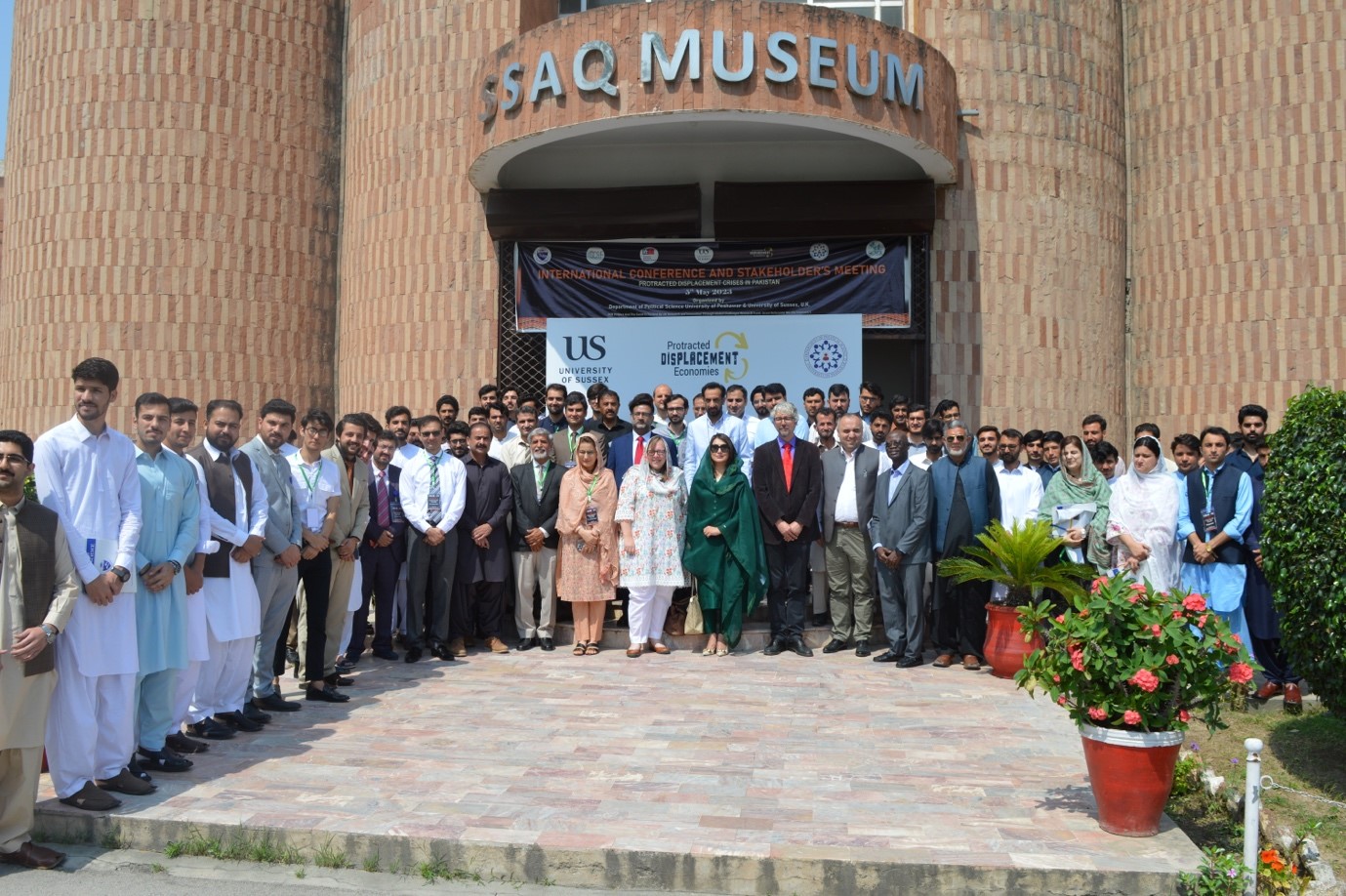An international conference on the theme of ‘Protracted Displacement Crises in Pakistan’ took place on 5 May 2023 in Peshawar. It was organised by the Department of Political Science, University of Peshawar. The event was attended by over 160 people, including representatives of national and international non-governmental organisations (Khwando Kor and IDEAS), as well as academics and students from various universities in Pakistan. The provincial heads of the UN Refugee Agency and International Organization for Migration attended the event. Representatives from the Commissionerate of Afghan Refugees in Chitral and from the camps also attended the conference.
In recognition of our role in the protracted displacement economy, a distinctive feature of the event was using the conference lobby to showcase the handicrafts of Afghan refugee women, who attended to display and sell their work. The participants took a keen interest in the beautiful creations of these artisans.
The event opened with a personal speech from the Secretary of Higher Education for the Khyber Pakhtunkhwa government, Dr Aneela Mehfooz Durrani. Dr Durrani appreciated the event and expressed her support for such an intellectual gathering. The Pakistan Co-Investigator of the Protracted Displacement Economies (PDE) project, Professor Abdul Rauf, introduced the conference and the project to the audience.
The first panel shared global-level findings from the PDE project (Professor Michael Collyer, University of Sussex and PDE Principal Investigator), and the findings specific to Pakistan (Professors Abdul Rauf and Shahida Aman, and Dr Ayub Jan, all from the University of Peshawar). In addition, a presentation by Dr Claude Samaha of Basmeh & Zeitooneh, one of the PDE partners based in Lebanon, provided the Pakistan-focused audience with an opportunity to make international comparisons.
The second and third panels opened the floor to Pakistan-based and international academics to share their work relating to PDE themes via panels on the ‘Political economy of displacement’ and ‘Identity, politics and displacement economies’. Fascinating presentations were given by Dr Muhammad Salman (Kings College London), Dr Rizwan Zeb (PAF Air War College Institute, Karachi), Faraz Ali (University of Swabi), Bilal Khan and Dr Syed Rashid Ali (Abdul Wali Khan University of Mardan), and Shehzad Ali and Dr Abida Bano (University of Peshawar). These presentations were a wonderful way of situating PDE work in wider academic discussions relating to displacement in Pakistan.
The final panel was a special one – screening some of the ‘Stories without Borders’ PDE films. Project partner and filmmaker Dr Yasmin Fedda (Queen Mary University of London) answered questions about the filmmaking process. The films received appreciation from the audience, with the Ethiopian film, ‘Naima’, eliciting appreciative laughter from the audience, as it has at every screening. At the end of the conference, Dr Ceri Oeppen (University of Sussex), presented her overall reflections on the conference, and Dr Jan thanked the participants and organisers for their support.
Celebrating Afghan and Pakistani musical culture
After the conference, a cultural event was held, showcasing the musical talent of Afghan and Pakistani musicians at historic Edwardes College. Renowned Pakistani and Afghan singers performed, to the delight of an appreciative audience. The legendary Zarsanga Bibi, also known as ‘The Queen of Pashtun Folklore’, opened the event, which also featured music from the great Afghan singer and musician, Ustad Amir Jan Herawi. Young Afghan singers and musicians Ustaz Nazir Latif, Sohrab Latif, Subhan Latif and Eeman Latif (from IDEAS School of Music), and Faisal Marwat, Abdal Khan and Edwin Yousaf (from Pakistan Shaukat Swati), also appeared.
The conference and cultural events were widely covered by national and international media outlets. The BBC (Pashto service) covered the conference and cultural event, including interviews with Professor Aman and Dr Jan. Voice of America (Deewa-Pashto service) featured the conference, including a short interview with Professor Aman. Pakistani newspapers such as Jhang, Express, Roznama Aieen and Bayaan, as well as the English-language LEAD Pakistan, published news stories relating to the conference.
